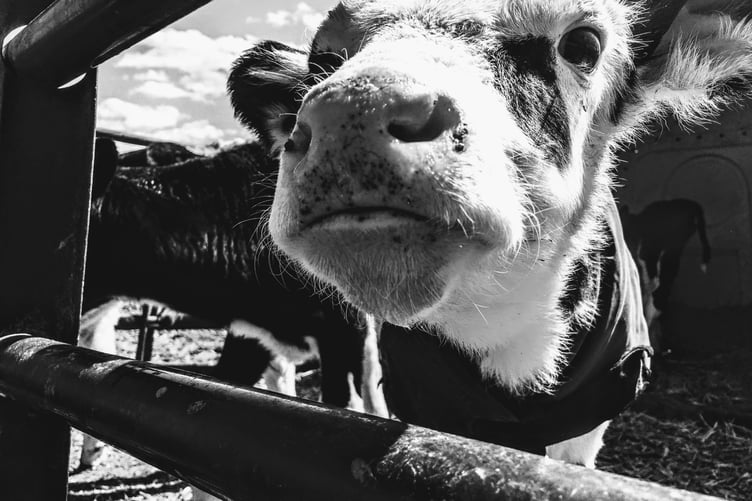The exemptions to pre-movement testing have been extended from June 12 until June 19 to allow livestock keepers sufficient time to prepare for the upcoming changes to the Bluetongue Control Policy in Wales.
From June 20, 2025 any susceptible animals (ruminants or camelids including cattle, sheep, goats, deer, llamas and alpacas) moving from a Bluetongue Restricted Zone to Wales to live will require a specific movement licence (on gov.uk), and valid pre-movement test at the keeper’s expense. If an animal is showing clinical signs on the day of transport they cannot move to Wales.
The following measures introduced during the low vector period will remain in place until July 1, 2025:
- Vector controls such as use of insecticides at approved markets or in vehicles and abattoirs are not required until 1 July.
- The requirement for slaughterhouses to be designated to receive animals from the Restricted Zone (RZ) remains suspended until 1 July.
From July 1, 2025 the Bluetongue Restricted Zone will expand to cover all of England.
Signs of BTV
Suspicion and confirmation
Contact your local Animal and Plant Health Agency (APHA) office immediately on 0300 303 8268 if you suspect Bluetongue.
APHA vets will investigate suspected cases.
Clinical signs
The following clinical signs may be present in sheep:
- ulcers or sores in the mouth and nose
- discharge from the eyes or nose and drooling from the mouth
- swelling of the lips, tongue, head, neck and coronary band (where the skin of the leg meets the horn of the foot)
Other clinical signs include:
- red skin as a result of blood collecting beneath the surface
- fever
- lameness
- breathing problems
- abortion
- death
The following clinical signs may be present in cattle:
- lethargy
- crusty erosions around the nostrils and muzzle
- redness of the mouth, eyes and nose
- reddening of the skin above the hoof
- nasal discharge
- reddening and erosions on the teats
- fatigue
- fever
- reduced milk yield
- loss of appetite
- abortion
Adult cattle may serve as a source of virus for several weeks while displaying little or no clinical signs of disease. They are often the preferred host for insect vectors.
Bluetongue in calves
Bluetongue can be transmitted to a foetus from an infected pregnant animal. This can lead to abortion, calves being born small, weak, deformed or blind, and death of calves within a few days of birth.
Livestock keepers and vets should consider bluetongue as a possible cause for calves showing these signs.
Transmission
Bluetongue virus can be spread by certain species of biting midges (Culicoides species). Many of which can be found throughout Great Britain.
Midges are infected with the virus when they bite an infected animal. The virus spreads when the infected midge then bites an uninfected susceptible animal. Once a midge has picked up the bluetongue virus it will be a carrier for the rest of its life.
Midges are most active between April and November. The weather (temperature, wind speed and direction, and rain) affects how quickly and how far midges can spread the disease.
Bluetongue virus can also be spread through the movement of infected animals, and through biological products such as:
- blood
- germinal products (semen, ova or embryos)
- including imports from countries where Bluetongue may be circulating undetected.
Prevention and control
You can help to prevent Bluetongue virus from spreading by:
- responsibly sourcing livestock
- remaining vigilant to signs of disease
- maintaining good hygiene and biosecurity on your premises
- housing animals in buildings that keep out biting midges – this is especially important at dawn and dusk
Vaccinating your animals
Three BTV-3 vaccines have been permitted for use. Two of these have been granted a marketing authorisation by the Veterinary Medicines Directorate (VMD), and the third is unauthorised. You can only use these vaccines if your use is compliant with a valid licence or declaration.
For more information on the BTV-3 vaccines including permits and licences visit Bluetongue serotype 3 (BTV-3) vaccination (on gov.uk).
Make sure your animals can be traced
If you keep animals as livestock or pets, you must follow rules to make sure they can be traced. This includes registering your land and animals.
- Read the rules for keeping cattle, sheep, goats and deer.
- Contact the Animal and Plant Health Agency (APHA) if you keep camelids (such as llamas or alpacas) or you’re unsure about the rules.
- Check if you need to apply for a specific movement licence (on gov.uk) to move animals onto or off a bluetongue restricted premises.
Keepers considering importing animals or biological products from BTV affected or potentially affected countries should consult their vet about the risks associated with these activities. This should be done before deciding to import. Imported animals that test positive for Bluetongue may be culled or be returned to the country of origin.
If you require advice or further information, contact the Pembrokeshire County Council Animal Welfare Team via [email protected]





Comments
This article has no comments yet. Be the first to leave a comment.